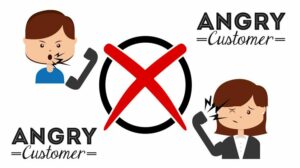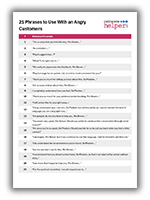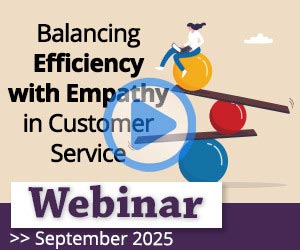Handling angry or irate customers in a call centre is never easy, but the right language can make all the difference. The way your agents respond can either defuse tension or escalate the situation.
In this article, we break down the four main types of irate customers and provide practical, effective phrases to help your team navigate these tough interactions.
Plus, we share key words to use, expert tips from our readers, and proven strategies to turn frustration into resolution.
4 Personality Types of Angry Customers
Here are the four main angry customer personality types with examples of what to say when dealing with each customer.
1. The Offloader
More often than not, this type of caller will have no legitimate grievance against your enterprise. Rather, he or she will have suffered a recent personal strain and, without anybody else to vent to, will turn to taking their grievance out on your staff. This frequently involves amplifying the most minor of complaints right out of proportion.
This type of caller is among the most frustrating for a contact centre agent; he or she will likely have encountered legitimately furious customers in the past and may feel that to “mollycoddle” their Offloader is a waste of time and energy.
Even so, the caller should be taken as seriously as possible, and formally empathetic language should be used at all times.
The following is a list of phrases best suited to dealing with this type of angry customer; note that the words of particular importance have been highlighted – for best results, these should be repeated at various points throughout the conversation.
Examples of what to say when dealing with ‘The Offloader’
- “I’m so sorry that you feel this way, Mrs Brown…”
- “As a solution,…”
- “May I suggest that…?”
- “What I’ll do right now is…”
- “We really do appreciate this feedback, Mrs Brown…”
- “May I arrange for an update call, at a time most convenient for you?”
2. The Legitimate Grievance
Mistakes happen; it’s a fact of life, and it’s forgiveable. But, from time to time, corporations miss their service level agreements by such a margin that even the most experienced of inbound agents has difficulty believing the magnitude of the failing.
The Legitimate Grievance is far and away the most important item discussed on this list. You have severely failed your customer and, should the case be publicised on social media, the ramifications for your business could be serious.
Agents who encounter this sort of complainant should, of course, escalate the call to their nearest team leader without delay. But in the interim, it would do no harm to offer some words of empathetic reassurance.
Examples of what to say when dealing with ‘The Legitimate Grievance’ customer
- “Thank you so much for letting us know about this, Sir/Madam…”
- “I’m so sorry to hear about this, Mrs Brown…”
- “I completely understand how you feel, Sir/Madam…”
- “Thank you so much for your patience/understanding, Mrs Brown…”
- “I will action this for you right away…”
3. The Abusive Customer
Ah, the Abusive Customer: a fascinating specimen, easily identifiable through its signature high pitch and generous use of profanity.
Paradoxical as it sounds, many agents look forward to receiving calls from this sort of customer. The reason? Well, since corporations’ duty of care towards their employees includes protection from client abuse, the rare emergence of the Vulgarian appears to present a good opportunity to terminate the call.
Though no employee should be expected to put up with personal insults, it is industry standard for agents to warn abusive customers at least three times before ending the conversation. Still, there are a series of phrases that can help to restore calm.
Of course, even more important than the language used is the ability of the agent to hold his or her cool under pressure; needless to say, there can be no excuse for insulting a customer – such an act would constitute gross misconduct, even if done in retaliation.
So, along with encouraging professional lingo, school your staff in the emotional side of dealing with abusive callers.
Examples of what to say when dealing with ‘The Abusive Customer”
- “I truly understand your concern, Sir/Madam, but unfortunately we cannot tolerate the kind of language you are using right now…”
- “I’m going to do my very best to help you, Mrs Brown…”
- “You seem very upset, Mrs Brown. Would you prefer to continue this conversation through email or post?”
- “I’m sorry you’re so upset, Sir/Madam. Would you like for us to call you back when you feel a little calmer?”
- “I apologise, Mrs Brown, but if you continue to use this language, I will be forced to end this call.”
Profanity Spiel For Customer Service
Dealing with profanity in a call centre requires a structured, empathetic approach to maintain professionalism and resolve issues effectively.
Here’s a spiel that can be used by call centre agents when confronted with a caller using profanity:
“I understand that you’re upset, and I want to help you resolve this issue. However, I must ask that we keep the conversation respectful and avoid using inappropriate language.
This will allow me to assist you more effectively. If the language continues, I may need to end this call and we can try and resolve your concern through other channels. I appreciate your understanding.”
Key Points of the Spiel
- Acknowledge the Caller’s Frustration: Show empathy to the caller’s situation to defuse tension.
- Request Respectful Communication: Politely ask for a respectful dialogue to maintain a productive conversation.
- Warn of Possible Call Termination: Clearly state the consequences of continued profanity, emphasising a professional and respectful environment.
- Offer Alternative Solutions: Suggest resolving the issue through other means if necessary, reinforcing a commitment to addressing their concern.
This approach balances maintaining professional standards with genuine effort to assist the caller, while also setting clear boundaries.
If you choose to make a policy for dealing with this type of angry customer, read our article: A Policy for Dealing with Angry and Abusive Customers
4. The Threat-Maker
Easily confused with The Abusive Customer, the Threat-Maker is, in fact, a different kettle of chips altogether. Whilst the former’s intention is to insult the call handler into cessation, the latter seeks to obtain appeasement through emotional or even physical intimidation.
Of course, most agents have dealt with enough Threat-Makers to know that, despite their dogged self-conviction, the vast majority of threats levied are as empty as a church on Monday morning. Even so, many telephone staff find this complainant’s tactics the most provocative of any irate caller.
As such, it’s important again to remind staff not to react to intimidation; to do so would just give the caller further ammunition, and add weight to a grievance that was, perhaps, spurious.
Sticking to one’s guns is the key to success over the Threat-Maker; offering inappropriate compensation will serve only to encourage future complaints.
Moreover, it’s important to remember that, regardless of how unpleasant he or she might be as a person, each and every one of your customers is an essential source of revenue for your business.
Agents should strive for a golden mean between level-headed formality and empathy for the customer’s condition.
Examples of what to say when dealing with ‘The Threat-Maker”
- “I do understand the inconvenience you’ve faced, Sir/Madam…”
- “Let me see how I can fix this, Mrs Brown…”
- “I recommend that you (Insert action here), Sir/Madam, so that I can take further action without delay.”
- “I am more than happy to help you, Mrs Brown…”
- “For the quickest resolution, I would request you to…”
Contributed by: George Dixon
For more types of challenging customers and our advice for dealing with them, read our article: How to Handle Contacts From Challenging Customers
Printable – 21 Phrases to Use When Dealing With an Angry Customers
Do you want to download this to share with your team?
Get your free download of 21 Phrases to Use With an Angry Customers now:
★★★★★
Specific Words to Use with Angry Customer?
So, we now know what phrases to use when dealing with the different types of angry customers in the call centre. But what specific words are central to all of these expressions?
Find out below, and if you remember these words, the right statements to use should start to fall off the tip of your tongue. You can also learn to build them into your call centre spiels, when thinking about how to handle angry customers.
“I”
There are occasions when you can use “we”, like when taking feedback and noting that the company will take it on board, but for the most part, you should always use personal pronouns, especially “I”.
This is so the angry customer understands that you are a real person and are invested in them individually. The caller will feel less stranded if you take personal ownership of their problem and taking away this isolation will help to remove frustration.
“Yes”
Customers want to hear what you can do to solve their problem, so it is important to avoid negatives such as “no” and replace them with positive words like “yes”.
A good technique to help to achieve this would be to listen to the customer’s rant and say “Yes, …” and then repeat what they have said back to them. This helps to confirm to the customer that what they have said was understood, whilst you have added a positive spin to the conversation.
“Definitely”
Words like “definitely”, as well as “absolutely”, “certainly” and so on, can help a difficult interaction.
Why? Because they are affirmatives that take away uncertainty from a conversation, as this kind of language will remove doubt.
For more positive words like ‘Definitely’, read our article: The Top 25 Positive Words and Phrases for Customer Service
“Feedback”
In many cases, an irritated person does not like to be told or it to be insinuated that they are angry, so try to remain positive.
So, when the customer has come to the end of their rant, you can better handle the situation by referring to what they have said as feedback and perhaps mentioning that you will pass it on to the managerial team.
“Understanding”
This is an example of the progressive form of a verb, and others such as “resolving” and “asking” are particularly good when handling an irate customer, as they show that you are actively working to fix an issue.
This removes the insinuations of future-tense forms, like “I’ll resolve” and “I’ll ask”, which don’t suggest the immediacy that the angry customer will undoubtedly crave.
“Currently”
Using this word has a similar purpose to using the progressive forms of verbs, as you are informing the customer of your immediate actions, so that they feel as though they are in the loop.
It could then be useful to follow this up by informing the angry customer of your action plan for resolving their query and, if needs be, specify a realistic timeframe in which you will deliver a solution.
“Recommendation / Suggestion”
To avoid telling a customer what they should or could have done, make sure you make recommendations or suggestions to offer advice, in order to avoid patronising them.
You run the risk of angering customers further if you offer them advice in a condescending tone, especially if the problem is on a computer or a technical gadget.
To find more words to turn negative situations with angry customers around, read our article: Positive Words to Increase Customer Satisfaction
★★★★★
How to Deal With Angry Customers
Here are some additional suggestions sent in by our readers. These involve suggestions of words and phrases to use, as well as other general advice to consider for how to handle angry customers.
Add Empathy in Your Conversations
In some instances, it is important to show empathy with what the customer is saying, even agreement.
For example, you could say: “If that happened to me, I would also be annoyed.”
But what we need to concentrate on is stating that we are acknowledging that we understand the customer. Nobody argues if someone agrees with them. Do we always need to apologise? No!
Why put ourselves on the back foot all of the time? Customers believe that they expect an apology. Again… very few customers in my experience call up for an apology… they call up to have the issue resolved.
Apologies often result in the advisor feeling as if the customer has the upper hand. Let’s stop this parent / child customer / advisor relationship.
Contributed by: Ross
If you want to find out how to add empathy during customer conversations, read our article: Empathy Statements for Customer Service With Examples
Let The Irate Customer Vent
The customer may not be right, but the customer is always the customer. Remember the person on the end of the phone is not shouting at you. Don’t take it personally!
They are shouting at the business you work for. So, sit back, relax and let the customer rant and rave. If you consider that they are shouting at you all the time, then you shouldn’t be in the call centre business. So, remember always stay calm and you’ll shine.
Contributed by: Alaya
Stick to This Four-Point Plan
- Make Notes – First listen to the customer very carefully and patiently. Make a note of every detail, as you can make your customer increasingly irate if you make them repeat and convey that you don’t care.
- Don’t Interrupt – Never, never interrupt the customer while they are explaining the issue. Let them pour out their aggression, and get them ready to listen and understand what you are saying. Always take a pause before you start. It’ll help you avoid interruption.
- Watch Your Tone – What you say is important; however, how you say it is even more important. So please make sure you pay attention to it. Saying anything or everything in a flat tone will make situation even worse.
- Smile – Last but not the least, keep smiling. It’ll help you not to lose your patience and keep calm, but it will also help you resolve the issue more effectively.
Contributed by: Gaurav Rana
Be Careful With Apologies
An apology given where it is not necessary is of no value to the customer and only serves to engender feelings of resentment in the agent.
These agents may think, “I’m being made to apologise to this person when all they’ve done is abuse me and I/the company have done nothing wrong.”
Think about it for a moment: how many times, just in general conversation, do you hear people say:
- “I’m sorry, but I don’t agree”
- “Well, I’m sorry, but I never agreed to that”
- “I’m sorry, but I’m not very happy”
What is there to be sorry about?
People use “I’m sorry” as a kind of shield, or a sweetener, before delivering something that they feel the other party will react negatively towards. And it displays a lack of confidence in their own opinions and feelings.
I’d like to see empathy combined with practicality from agents (not just my own) without ubiquitous apologies. Then, where an apology is given, it carries far more weight, is sincere and actually means something.
Contributed by: Jake
For advise on how to offer a great apology, which may just be the key to turning around an angry customer, read our article: Customer Service Apologies – Keeping Sorry Fresh and Sincere
Follow The PIA Principle
The practice we have is using the PIA terms, which stands for:
P – Power word (react to the customer’s emotion), “oh” or “oh my”.
I – I statement (relating to the customer’s experience) showing a human connection.
A – Assurance that you’re going to resolve the customer’s issue.
Example of using PIA: “Oh my, I can only imagine what you have been through… Let me pull up your account. I can definitely check available options for you.”
Contributed by: Jolahadhen
Never Repeat The Phrase: “I Understand How You Feel”
In general practice, you should NEVER say that you understand how a customer is feeling. From personal experience, I can tell you that it never goes down well with the customer because to them you do not understand.
Trying to dig yourself out of this hole is impossible. Yes, you may have kids too, but you do not have their kids. Yes, you may own a similar product but you do not own their product.
This is especially the case when working in technical support or repairs, as if you say you understand them and then try to redeem yourself by saying you have had the same problem.
Even the nicest customer will pick up on this and get annoyed, assuming they have bought a faulty product from a bad brand, and may start to demand a replacement.
INSTEAD tell a customer that you appreciate their concern or anger. Tell them that you will help them to resolve this issue.
By doing this you validate their feelings without providing reason for argument. Just ensure that you sound sincere whilst saying it, or else it may come across as patronising.
Contributed by: Louise
For more examples of words and phrases to avoid when talking to customers – angry or not – read our article: 15 Things a Call Centre Agent Should Never Say (But Many Do)
If you want more advice on how to handle angry customer situations, read these articles next:
Author: Jonty Pearce
Reviewed by: Hannah Swankie

71 Comments
-
Contrary to the old adage that the customer is always right, I would modernise this and say that ‘the customer is not always right, but is always the customer’
Ian
5 Sep at 14:10
-
Simply listening to some of the callers listed is a useful tactic. However listening alone is not enough and the agent should summarise the callers words back to them. This has the effect of actively demonstrating you care, it can slow the conversation down (callers can’t be angry and talk slowly!) which allows a reasonable conversation to occur and a solution to be worked out.
Neil France
6 Sep at 11:57
-
Any words you use will be more or less effective depending on whether you use the right voice sound as you say them. The angry callers can only be one of three ego types: Directive (sounds telling), Logical (sounds sharing) or Passionate (sounds asking). Each state has two positive, neutral or negative sub sounds and the angry caller will be using the negative ones. Say it wrong and you will wind them up even more but you can say almost anything you like so long as you apply the emotional formula right.
Simon Bell
6 Sep at 12:01
-
I’m not so sure about “I’m sorry you’re so upset, Sir/Madam. Would you like for us to call you back when you feel a little calmer?” seems a little too patronising to me and think it could make the caller irate
Otherwise, this is a really sound article. A lot of interesting stuff to relay in training. Thanks!
Sean
6 Sep at 14:50
-
A good read. Shared this with my advisors today. Loved the turn of phrase left by Ian as did the advisors when we read it together. Keep these great tips coming.
Alistair James Back
6 Sep at 15:34
-
Great article thanks, certainly gives a different dimension to approaching complaints. We train out 3 steps – Respond and listen, Show appropriate empathy and Take ownership.
Lee Newbould
11 Sep at 09:12
-
“I am so sorry for any inconvenience this may have caused you” –
Patty
19 Dec at 01:36
-
Hugo
29 Dec at 16:11
-
Liked the article, my piece of advice on this subject is not to take it personal – remember the customer is angry at the situation not you as a perso. As stated in the 99 ways article ‘keep calm and carry on ‘ applies to these situations too.
Cath
3 Jan at 17:07
-
We apologize for the inconvenience this may have caused you.
poloma
22 Jan at 02:20
-
Well designed good job done
Skariah Thomas
3 Apr at 12:39
-
I understand sir/madam and feel where you are coming from. Now what i can do for you is i can speak to a team leader to see what options we have as i have found 2 minds are better than one and i can then advise you of what you need to do. I want to help you in the best possible way i have felt your frustration with the situation and we need to resolve this right away. I will be back in a momement. Do you mind waiting ? (go see your team leader) Thank you for patience sir/madam what we have found is that we can… (continue conversation) If all else fails escalate the call. Cheers
SoundLad
21 Apr at 20:51
-
The customer is not always right, but they are NEVER wrong.
it is critical the staff don’t make the customer feel less than or at worst silly for an opinion or thought…
Peter
24 Apr at 03:07
-
A customer is always a customer. You have to make them feel that you understand them no matter what it takes. YOU HAVE TO TAKE OWNERSHIP IN EVERY CALL. 🙂
alyssa
9 May at 14:04
-
I really appreciate the work here. This is very helpful specially when we need examples of phrases to be used in some difficult customer handling scenarios. Thanks and keep up the good work.
Rajiv
11 May at 23:00
-
My 2 tips are as follows: When you have a bad call and feel the customer was very difficult to deal with; put that call behind you. You cant do anything about the call once it is over. Its just like a turnover in a game of sports, it has happened and now you move on from it. 🙂 #2: “Don’t become cynical” because the situation that has happened to the customer is very real even though it may be a situation we deal with every day in our calls. 🙂
Tracy
27 May at 22:33
-
It will be a great pleasure to assist you today.
Ms.Black
8 Oct at 03:58
-
I know customers can be real jerks sometimes and it seem like you’ve fought a war for them and not good enough to them. There hand is always out for something more. But, don’t let it get to you, “Lay down the law” of your department and then tell them what you can do for them; that way your not getting there false hopes for something too far away.
Its not your fault for anything that’s going in there life that may or may not cause the issue, but turn it around and say, “if I was in your shoes, I probably feel the same way.” I am not telling you to kiss **, I am telling you to do not get emotional involved. Let them rave and kick and scream about the stitution and keep the same tone with a smile and don’t change a thing.
Respect, empathy, tone, enegry, needs, teamwork, identify, opimistic, negitate; spells Retention! No better customer service agent then a retention agent, you handle the call to the best you can and then pass to a different department that resolves the issues; and its usually the retention agent who do because there on at least a sup level skills on handle it better then normal, take my word for it because its the truth and the is gonna hurt when told. “Lay down the law” is my metto 😉
Tyrrea
10 Dec at 07:57
-
i know how frustrating it can be. I can assure you that i’m doing my best to stay on the top of the situation as i’m looking for all possible means to make things happen to you….
im sorry to hear that mr/ms.____ you must have been really upset with the irregularities but rest assure that i will verify this issue immediately and look for all possible solution to help you address your concern.
chabbyMe
20 Jan at 07:50
-
Sorry, sometimes the customer IS shouting at the poor sap who answers the phone and it is personal. There are a few manipulative clients who realize they have all the power as the customer and you, low employee answering the phone, have to take their abuse, accept and not refute their wild accusations that you are somehow to blame for the actions of your higher-ups. They win and are happy if they hear you become tearful as you choke out your “I am sorry you feel this way” in the midst of their rants that never pause. This way they can later say you “talked over them”, BTW. I swear they KNOW EXACTLY what they are doing.
Are you kidding??? Telling them that “I’m sorry you’re so upset, Sir/Madam. Would you like for us to call you back when you feel a little calmer” would be like throwing a bomb into a fire.
This special type of irate will then totally turn it around and accuse you of being the person who was shouting and being disrespectful. This happens to me at least a half dozen times a year. Lucky for me there are nearby witnesses to these instances as we all sit next to each other. The higher-ups are able to determine that the complaining client is not only mentally unstable but dishonest.
These irate power trippers get their accounts marked with ****’s so we know to never engage them or try to help them immediately (just sets up the slap in the face, alas( and force the to leave all calls in the voicemail of the higher-ups (in our case, Doctors and RNs) to whom they act respectfully and sweetly to over the phone.
Thank god most of our patients are nice, but the ones that are not are are REALLY not nice.
Works at a PCP
2 Feb at 02:17
-
I really learned a lot fromv the articles above…Im gonna apply some of them to my calls.
beyonce
22 Apr at 21:41
-
I’m so glad to have located this page, some helpful ways to deal with customer’s when they are having a difficult time handling a upsetting situation. I can’t wait to add this to my list. Thank You!
Lynnette
2 Jun at 02:09
-
very helpful indeed. i copie some so that i may apply it on my calls. thank you.
bella dela cruz
4 Jun at 17:20
-
thanks for this.. i learned a lot..
kaice sulapas
17 Jun at 09:35
-
i like the scheme of this page. it’s helpful. i hope though that phrases to pacify angry customers will be added here. more explicit and more vivid examples.
miggy
25 Jun at 08:06
-
this article is really helpful and also the comments from readers, I’ll definitely apply what I’ve learned from here
Anonymous
1 Jul at 11:45
-
Nice article, will apply what I learned from here
Maila C
1 Jul at 11:46
-
I’ve learned as much from the comments…more, really, than the article. Thanks. Thanks for keeping on point and making the original article even better.
Neel
1 Jul at 15:44
-
In the organisation I work for, we train our staff to use Empathy (I understand) – Explain (your reasons) and Offer alternatives. Empathy calms the customer down and puts you in their shoes and use the emotive words they are experiencing i.e. ‘I understand how frustrating…upsetting…angry etc’ You need to understand the reason why you are saying No and don’t hide behind policies. And finally by offering them the alternative, they are likely to be less frustrated. The tips are to let them vent first but if they are rude then we train them to be assertive and remain calm…’Mr Brown I have not been rude to you so there is no need to be rude to me. If you calm down I will be able to assist you but if you continue to be rude I would have to terminate this call’.
Ps. I really found your links and tips very useful and will help me with my training! Thanks.
Terri Oke
2 Jul at 18:11
-
CAROL
23 Jul at 08:06
-
Eve
24 Jul at 22:59
-
Unless they have a legitimate grievance, stop enabling them to be horrible to your agents and don’t fix their ‘problem’ until they can show respect!!
Sophie
25 Jul at 18:08
-
awesome! i wish that i could tell the cust for thek to be enlightened.. how i wish:)
jerry
28 Jul at 01:28
-
I found your tips and links very helpful and informative in my field of work.
ERMAN
30 Aug at 08:16
-
Gary
31 Aug at 11:05
-
Having 10 years call centre experience, i was always told NEVER to say “I understand” Replace i understand with, “I can appreicate where you are coming from”
No one can ever truly understand what a customer is going through unless they have been through the EXACT same thing.
I loved everything on this page!!!!!
GREAT JOB
Anon
2 Oct at 07:03
-
I am very thankful for this. this gives a great confident to deal with your customers. many thanks……
kunal
6 Oct at 09:47
-
this site was very helpful, thank you, got too many informations, but pls help me with call centre presentations, i work in a clinic, very shortly will be starting a call centre
sjn
9 Oct at 07:18
-
“im sorry, I cant relate to your situation; but you have my Condolence’.
“your correct”
“ill do what i can to make this to your satisfaction” < don't use unless u know u can!!
CapitalOne Rep
17 Feb at 01:23
-
Sneha Nimje
24 Feb at 13:13
-
Very useful information!
Thanks a lot.
Luis
12 Mar at 19:32
-
I am actually having to write a presentation about this topic for my company after issues came up when i first started at the center where I work. It’s part of my goals( boss created) for next year in my annual review.
Cynthia Fulbright
12 Mar at 22:07
-
I would never use phony words like ‘truly’ – they sound so insincere. If you don’t use a word in everyday life, don’t use it to try to convey concern to a customer.
Shaynie
13 May at 00:15
-
Very useful tips!
Thanks!
Jay Santiago
28 May at 10:11
-
The finest piece of advice I have heard is as follows (and it applies across the board in all areas of life)
” treat every person you meet as if they are the most important person with whom you will speak that day ”
This makes happy customers happier, angry customer calm, and ensures good relations with your co-workers and boss(es).
Everybody likes to FEEL important, and by making someone feel like they are a priority, you make them feel good, also, by keeping a professional tone you make them feel VIP, and often instil a type of professional demeanor in return. (If you make them feel like they are VIP, they will tend toward acting the way they feel right…)
Angry customers are a fact of life, make them feel understood, show empathy, remain calm and professional.
The one thing that always calms me down when I am the angry customer is when the person keeps their composure and speaks professionally, and explains to me what steps are being taken. I absolutely do NOT want to hear ” I know how you feel, I can imagine that must be frustrating ” etc, instead I want to hear ” yes Sir, I’m just going to pull up your account details quickly to see exactly what was charged to your account, just a moment please ”
That is personal preference though, I don’t like them to give me insincere apologies, I want professional service at all times and I want to know that you understand my problem, as well as your plan to rectify/explain it .
Just my 2 cents from both perspectives
Economist
29 Jun at 01:26
-
Also, might I add that if you really want to make me angrier when I’m the irate customer, then respond to my serious complaint with “a smile in your face”
When I am angry at the company, I want you do be serious, don’t be all bubbly and cheery when I just complained about poor service and am clearly upset.
Economist
29 Jun at 01:35
-
When I’m upset about a situation, I want the person I’m speaking with to sound interested or at the very least curious about why I’m upset. What really ticks me off is when I have a legit gripe, and the CSR sounds bored, annoyed, or is otherwise non responsive.
I always tell my CSRs that even if you didn’t make the error, or if the error is on the customer’s part, at least sound like you care, and say “I can see why you’re upset. Let’s get this taken care of right now. What I can do is…”
Jenn
31 Jul at 14:53
-
I fought the”apologizing” because, to me, it sounds so fake. I’ve even had customers tell me not to say “I’m sorry”. I’ve started saying “I apologize for the inconvenience” and “I can relate to how you feel, I am a consumer myself”. I always repeat what I heard them say and tell them that I will be very happy to look into the issue for them. I end every call with “have I been able to help resolve your issue?”.
Leslie
21 Aug at 02:46
-
Awesome tips and comments.It really helps me a lot.
query
24 Aug at 02:25
-
really helpful , I am in customer service from past 1 month and this article will surely help me
vanshika
26 Aug at 05:22
-
Im in customer service for 2 years and yet too. This article gave me an extra words to give more kind words.
shaeed
26 Aug at 07:09
-
really great I learned a lot .Thanks!
Monica
27 Oct at 23:52
-
Very heplful info and phrases which we can use in our life
Renu
26 Nov at 12:01
-
Very Useful information.
Thank you so much for this.
Shubahm
23 Dec at 12:26
-
I’m a receptionist at a very busy business. I often have to tell callers there is no one available to take their calls and I request the callers contact information. The callers I have the most difficulty with are the persistent callers who jeep asking me repeatedly you don’t have anyone avaikable? I can only answer that question one way which is no. If I can get that type of callers contact information they then repeat when will someone call them back. I have no way of knowing when the staff will be free to return calls. We have clients that we wait on who come into the business plus the high volume of calls. Any suggestions how to answer the persistent callers questions if no one available and when will someone call me back?
Debbie
16 Mar at 02:21
-
I usually use this line, “Had I be of the same situation, I will also feel the same” when I want to let the customer know I am with her/him while giving out the assurance that I am capable to resolve their issue.
Anyway, this article is amazingly awesome! Thank you so much.
eMGee Kyu
21 Mar at 21:35
-
Avoid saying, “I’m sorry you feel this way!
…It implies that the customer is wrong for feeling the way they do. Instead, try:
“I’m sorry this has caused you to feel this way”.
See the difference? It validates the customer’s feelings and recognises that the situation is causing it.
Dean
7 Apr at 13:56
-
For Debbie the receptionist. I would suggest you speak with your employer and set a time frame to give callers for the return call. Something like all associates are on other duties at this time, If you will provide your contact information an associate should return you call in 24 to 72 hours.
TJ
11 May at 17:47
-
wow this was really helpful,will definitely apply it on my calls
kefilwe
1 Jun at 08:19
-
I always go back to this page. the article and comments are informative and helpful.
My take away here is that you need to be professional no matter what.
you cant always please all your customers. move on and don’t let it affect your next call.
RAE
30 Jun at 22:09
-
This article has been extremely helpful I must say. In my opinion regarding handling difficult customers, I believe it is more important over apologizing/empathizing, that CSRs state clearly how and when they will resolve customers’ complaints as most customers only get upset because they had to make similar complaints repeatedly. Understand the root cause of issues identified and assure the customer the organization will try its best in ensuring same does not re-occur.
In cases where customer is merely upset because he/ she does not understand the product/ service, CSRs should empathize with the customer and carefully explain and send to them FAQs on same for easier comprehension. I think this should help. Great Work!
Anon
15 Jul at 13:35
-
This site is really helpful and I learned a lot from this site as well as the comments left by above friends.
Wonderful job guys..Kindly ahre more informations so that it will help us in a better way.
Cynthia George
5 Oct at 05:59
-
This site is really helpful and I learned a lot from this site as well as the comments left by above friends.
Wonderful job guys..Kindly share more informations so that it will help us in a better way.
Cynthia George
5 Oct at 06:02
-
Melai
7 Nov at 23:58
-
Thank you for sharing your ideas guys!
very helpful!!!!
ZoeP
28 Nov at 04:43
-
Im so happy I found this article Now I have something to bank on w/ my calls specially for irrate customers!!!! I cant wait to use this to each and every calls I will be dealling with….Hope youll give us more tips for being a EFFECTIVE CSR!!!!God bless!!! GEAL
gEAL
30 Nov at 05:36
-
Thank you very much, I’m a newly hired customer service rep.
This will help me a lot with this job.
All of this are not included on our training.I will definitely use this site as my training site.
Chrisnoly presco
31 Jan at 15:51
-
Successful reply for me has been, “I’ve got the ball from here. Let me handle this and I will get back to you within the hour, with my results for you.”
Robin Cortez
23 Feb at 18:51
-
I was a difficult customer once. (because we are not perfect) and the best line used on me was
“well how would you like to proceed mam, because I already told you (the option)?”
I was like BAMN stop being annoying you, she is actually telling ur the truth of how she can’t help you.
I do think that this line has to be used really calmly, because it can’t get ugly really quick if said by a smirk. But what y’all think?
Tatiana
8 Mar at 17:00
-
I cant impress upon you how important it is not to say ‘I’m sorry you feel that way’. Any customer with two brain cells to rub together will see right through this as the non apology it is.
Instead, try ‘I’m sorry to hear that you are experiencing this issue.’ Or I’m sorry to see that this issue is affecting you.
Nathan
27 Apr at 17:49
-
Very good suggestions that I can use in different scenario’s, in my Customer Serv. Receptionist/ Dispatcher roles. I converse with many different types of situations for my company. My supervisor suggested I look on line, and found your site. Thank you
Lynn
27 Sep at 19:31
Get the latest call centre and BPO reports, specialist whitepapers and interesting case-studies.








































Contrary to the old adage that the customer is always right, I would modernise this and say that ‘the customer is not always right, but is always the customer’
Simply listening to some of the callers listed is a useful tactic. However listening alone is not enough and the agent should summarise the callers words back to them. This has the effect of actively demonstrating you care, it can slow the conversation down (callers can’t be angry and talk slowly!) which allows a reasonable conversation to occur and a solution to be worked out.
Any words you use will be more or less effective depending on whether you use the right voice sound as you say them. The angry callers can only be one of three ego types: Directive (sounds telling), Logical (sounds sharing) or Passionate (sounds asking). Each state has two positive, neutral or negative sub sounds and the angry caller will be using the negative ones. Say it wrong and you will wind them up even more but you can say almost anything you like so long as you apply the emotional formula right.
I’m not so sure about “I’m sorry you’re so upset, Sir/Madam. Would you like for us to call you back when you feel a little calmer?” seems a little too patronising to me and think it could make the caller irate
Otherwise, this is a really sound article. A lot of interesting stuff to relay in training. Thanks!
A good read. Shared this with my advisors today. Loved the turn of phrase left by Ian as did the advisors when we read it together. Keep these great tips coming.
Great article thanks, certainly gives a different dimension to approaching complaints. We train out 3 steps – Respond and listen, Show appropriate empathy and Take ownership.
“I am so sorry for any inconvenience this may have caused you” –
Thank you!
Liked the article, my piece of advice on this subject is not to take it personal – remember the customer is angry at the situation not you as a perso. As stated in the 99 ways article ‘keep calm and carry on ‘ applies to these situations too.
We apologize for the inconvenience this may have caused you.
Well designed good job done
I understand sir/madam and feel where you are coming from. Now what i can do for you is i can speak to a team leader to see what options we have as i have found 2 minds are better than one and i can then advise you of what you need to do. I want to help you in the best possible way i have felt your frustration with the situation and we need to resolve this right away. I will be back in a momement. Do you mind waiting ? (go see your team leader) Thank you for patience sir/madam what we have found is that we can… (continue conversation) If all else fails escalate the call. Cheers
The customer is not always right, but they are NEVER wrong.
it is critical the staff don’t make the customer feel less than or at worst silly for an opinion or thought…
A customer is always a customer. You have to make them feel that you understand them no matter what it takes. YOU HAVE TO TAKE OWNERSHIP IN EVERY CALL. 🙂
I really appreciate the work here. This is very helpful specially when we need examples of phrases to be used in some difficult customer handling scenarios. Thanks and keep up the good work.
My 2 tips are as follows: When you have a bad call and feel the customer was very difficult to deal with; put that call behind you. You cant do anything about the call once it is over. Its just like a turnover in a game of sports, it has happened and now you move on from it. 🙂 #2: “Don’t become cynical” because the situation that has happened to the customer is very real even though it may be a situation we deal with every day in our calls. 🙂
It will be a great pleasure to assist you today.
I know customers can be real jerks sometimes and it seem like you’ve fought a war for them and not good enough to them. There hand is always out for something more. But, don’t let it get to you, “Lay down the law” of your department and then tell them what you can do for them; that way your not getting there false hopes for something too far away.
Its not your fault for anything that’s going in there life that may or may not cause the issue, but turn it around and say, “if I was in your shoes, I probably feel the same way.” I am not telling you to kiss **, I am telling you to do not get emotional involved. Let them rave and kick and scream about the stitution and keep the same tone with a smile and don’t change a thing.
Respect, empathy, tone, enegry, needs, teamwork, identify, opimistic, negitate; spells Retention! No better customer service agent then a retention agent, you handle the call to the best you can and then pass to a different department that resolves the issues; and its usually the retention agent who do because there on at least a sup level skills on handle it better then normal, take my word for it because its the truth and the is gonna hurt when told. “Lay down the law” is my metto 😉
i know how frustrating it can be. I can assure you that i’m doing my best to stay on the top of the situation as i’m looking for all possible means to make things happen to you….
im sorry to hear that mr/ms.____ you must have been really upset with the irregularities but rest assure that i will verify this issue immediately and look for all possible solution to help you address your concern.
Sorry, sometimes the customer IS shouting at the poor sap who answers the phone and it is personal. There are a few manipulative clients who realize they have all the power as the customer and you, low employee answering the phone, have to take their abuse, accept and not refute their wild accusations that you are somehow to blame for the actions of your higher-ups. They win and are happy if they hear you become tearful as you choke out your “I am sorry you feel this way” in the midst of their rants that never pause. This way they can later say you “talked over them”, BTW. I swear they KNOW EXACTLY what they are doing.
Are you kidding??? Telling them that “I’m sorry you’re so upset, Sir/Madam. Would you like for us to call you back when you feel a little calmer” would be like throwing a bomb into a fire.
This special type of irate will then totally turn it around and accuse you of being the person who was shouting and being disrespectful. This happens to me at least a half dozen times a year. Lucky for me there are nearby witnesses to these instances as we all sit next to each other. The higher-ups are able to determine that the complaining client is not only mentally unstable but dishonest.
These irate power trippers get their accounts marked with ****’s so we know to never engage them or try to help them immediately (just sets up the slap in the face, alas( and force the to leave all calls in the voicemail of the higher-ups (in our case, Doctors and RNs) to whom they act respectfully and sweetly to over the phone.
Thank god most of our patients are nice, but the ones that are not are are REALLY not nice.
I really learned a lot fromv the articles above…Im gonna apply some of them to my calls.
I’m so glad to have located this page, some helpful ways to deal with customer’s when they are having a difficult time handling a upsetting situation. I can’t wait to add this to my list. Thank You!
very helpful indeed. i copie some so that i may apply it on my calls. thank you.
thanks for this.. i learned a lot..
i like the scheme of this page. it’s helpful. i hope though that phrases to pacify angry customers will be added here. more explicit and more vivid examples.
this article is really helpful and also the comments from readers, I’ll definitely apply what I’ve learned from here
Nice article, will apply what I learned from here
I’ve learned as much from the comments…more, really, than the article. Thanks. Thanks for keeping on point and making the original article even better.
In the organisation I work for, we train our staff to use Empathy (I understand) – Explain (your reasons) and Offer alternatives. Empathy calms the customer down and puts you in their shoes and use the emotive words they are experiencing i.e. ‘I understand how frustrating…upsetting…angry etc’ You need to understand the reason why you are saying No and don’t hide behind policies. And finally by offering them the alternative, they are likely to be less frustrated. The tips are to let them vent first but if they are rude then we train them to be assertive and remain calm…’Mr Brown I have not been rude to you so there is no need to be rude to me. If you calm down I will be able to assist you but if you continue to be rude I would have to terminate this call’.
Ps. I really found your links and tips very useful and will help me with my training! Thanks.
THANKS A LOT
Very enlightening
Unless they have a legitimate grievance, stop enabling them to be horrible to your agents and don’t fix their ‘problem’ until they can show respect!!
awesome! i wish that i could tell the cust for thek to be enlightened.. how i wish:)
I found your tips and links very helpful and informative in my field of work.
good work.
Having 10 years call centre experience, i was always told NEVER to say “I understand” Replace i understand with, “I can appreicate where you are coming from”
No one can ever truly understand what a customer is going through unless they have been through the EXACT same thing.
I loved everything on this page!!!!!
GREAT JOB
I am very thankful for this. this gives a great confident to deal with your customers. many thanks……
this site was very helpful, thank you, got too many informations, but pls help me with call centre presentations, i work in a clinic, very shortly will be starting a call centre
“im sorry, I cant relate to your situation; but you have my Condolence’.
“your correct”
“ill do what i can to make this to your satisfaction” < don't use unless u know u can!!
Great post to read.
Very useful information!
Thanks a lot.
I am actually having to write a presentation about this topic for my company after issues came up when i first started at the center where I work. It’s part of my goals( boss created) for next year in my annual review.
I would never use phony words like ‘truly’ – they sound so insincere. If you don’t use a word in everyday life, don’t use it to try to convey concern to a customer.
Very useful tips!
Thanks!
The finest piece of advice I have heard is as follows (and it applies across the board in all areas of life)
” treat every person you meet as if they are the most important person with whom you will speak that day ”
This makes happy customers happier, angry customer calm, and ensures good relations with your co-workers and boss(es).
Everybody likes to FEEL important, and by making someone feel like they are a priority, you make them feel good, also, by keeping a professional tone you make them feel VIP, and often instil a type of professional demeanor in return. (If you make them feel like they are VIP, they will tend toward acting the way they feel right…)
Angry customers are a fact of life, make them feel understood, show empathy, remain calm and professional.
The one thing that always calms me down when I am the angry customer is when the person keeps their composure and speaks professionally, and explains to me what steps are being taken. I absolutely do NOT want to hear ” I know how you feel, I can imagine that must be frustrating ” etc, instead I want to hear ” yes Sir, I’m just going to pull up your account details quickly to see exactly what was charged to your account, just a moment please ”
That is personal preference though, I don’t like them to give me insincere apologies, I want professional service at all times and I want to know that you understand my problem, as well as your plan to rectify/explain it .
Just my 2 cents from both perspectives
Also, might I add that if you really want to make me angrier when I’m the irate customer, then respond to my serious complaint with “a smile in your face”
When I am angry at the company, I want you do be serious, don’t be all bubbly and cheery when I just complained about poor service and am clearly upset.
When I’m upset about a situation, I want the person I’m speaking with to sound interested or at the very least curious about why I’m upset. What really ticks me off is when I have a legit gripe, and the CSR sounds bored, annoyed, or is otherwise non responsive.
I always tell my CSRs that even if you didn’t make the error, or if the error is on the customer’s part, at least sound like you care, and say “I can see why you’re upset. Let’s get this taken care of right now. What I can do is…”
I fought the”apologizing” because, to me, it sounds so fake. I’ve even had customers tell me not to say “I’m sorry”. I’ve started saying “I apologize for the inconvenience” and “I can relate to how you feel, I am a consumer myself”. I always repeat what I heard them say and tell them that I will be very happy to look into the issue for them. I end every call with “have I been able to help resolve your issue?”.
Awesome tips and comments.It really helps me a lot.
really helpful , I am in customer service from past 1 month and this article will surely help me
Im in customer service for 2 years and yet too. This article gave me an extra words to give more kind words.
really great I learned a lot .Thanks!
Very heplful info and phrases which we can use in our life
Very Useful information.
Thank you so much for this.
I’m a receptionist at a very busy business. I often have to tell callers there is no one available to take their calls and I request the callers contact information. The callers I have the most difficulty with are the persistent callers who jeep asking me repeatedly you don’t have anyone avaikable? I can only answer that question one way which is no. If I can get that type of callers contact information they then repeat when will someone call them back. I have no way of knowing when the staff will be free to return calls. We have clients that we wait on who come into the business plus the high volume of calls. Any suggestions how to answer the persistent callers questions if no one available and when will someone call me back?
I usually use this line, “Had I be of the same situation, I will also feel the same” when I want to let the customer know I am with her/him while giving out the assurance that I am capable to resolve their issue.
Anyway, this article is amazingly awesome! Thank you so much.
Avoid saying, “I’m sorry you feel this way!
…It implies that the customer is wrong for feeling the way they do. Instead, try:
“I’m sorry this has caused you to feel this way”.
See the difference? It validates the customer’s feelings and recognises that the situation is causing it.
For Debbie the receptionist. I would suggest you speak with your employer and set a time frame to give callers for the return call. Something like all associates are on other duties at this time, If you will provide your contact information an associate should return you call in 24 to 72 hours.
wow this was really helpful,will definitely apply it on my calls
I always go back to this page. the article and comments are informative and helpful.
My take away here is that you need to be professional no matter what.
you cant always please all your customers. move on and don’t let it affect your next call.
This article has been extremely helpful I must say. In my opinion regarding handling difficult customers, I believe it is more important over apologizing/empathizing, that CSRs state clearly how and when they will resolve customers’ complaints as most customers only get upset because they had to make similar complaints repeatedly. Understand the root cause of issues identified and assure the customer the organization will try its best in ensuring same does not re-occur.
In cases where customer is merely upset because he/ she does not understand the product/ service, CSRs should empathize with the customer and carefully explain and send to them FAQs on same for easier comprehension. I think this should help. Great Work!
This site is really helpful and I learned a lot from this site as well as the comments left by above friends.
Wonderful job guys..Kindly ahre more informations so that it will help us in a better way.
This site is really helpful and I learned a lot from this site as well as the comments left by above friends.
Wonderful job guys..Kindly share more informations so that it will help us in a better way.
Love it,very helpfulツ
Thank you for sharing your ideas guys!
very helpful!!!!
Im so happy I found this article Now I have something to bank on w/ my calls specially for irrate customers!!!! I cant wait to use this to each and every calls I will be dealling with….Hope youll give us more tips for being a EFFECTIVE CSR!!!!God bless!!! GEAL
Thank you very much, I’m a newly hired customer service rep.
This will help me a lot with this job.
All of this are not included on our training.I will definitely use this site as my training site.
Successful reply for me has been, “I’ve got the ball from here. Let me handle this and I will get back to you within the hour, with my results for you.”
I was a difficult customer once. (because we are not perfect) and the best line used on me was
“well how would you like to proceed mam, because I already told you (the option)?”
I was like BAMN stop being annoying you, she is actually telling ur the truth of how she can’t help you.
I do think that this line has to be used really calmly, because it can’t get ugly really quick if said by a smirk. But what y’all think?
I cant impress upon you how important it is not to say ‘I’m sorry you feel that way’. Any customer with two brain cells to rub together will see right through this as the non apology it is.
Instead, try ‘I’m sorry to hear that you are experiencing this issue.’ Or I’m sorry to see that this issue is affecting you.
Very good suggestions that I can use in different scenario’s, in my Customer Serv. Receptionist/ Dispatcher roles. I converse with many different types of situations for my company. My supervisor suggested I look on line, and found your site. Thank you